Презентация по теор.грамматике.pptx
- Количество слайдов: 9
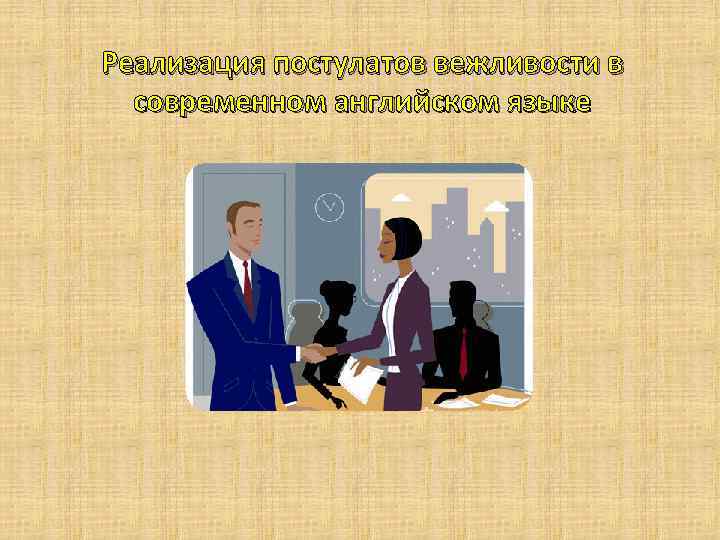 Реализация постулатов вежливости в современном английском языке
Реализация постулатов вежливости в современном английском языке
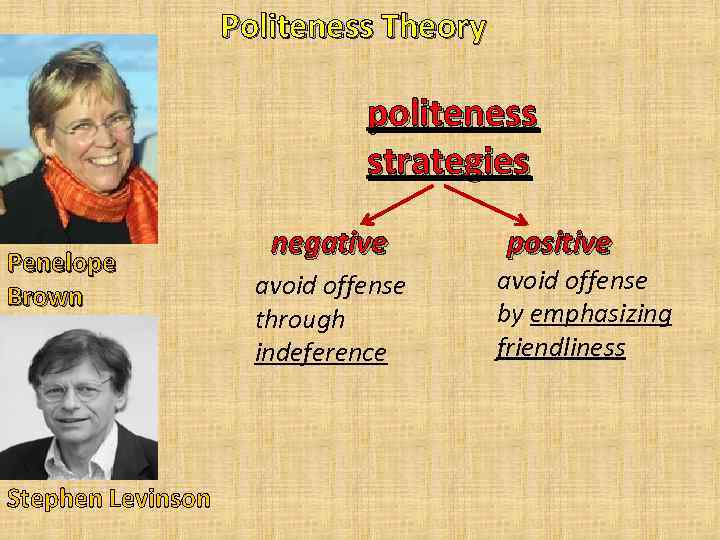 Politeness Theory politeness strategies Penelope Brown Stephen Levinson negative avoid offense through indeference positive avoid offense by emphasizing friendliness
Politeness Theory politeness strategies Penelope Brown Stephen Levinson negative avoid offense through indeference positive avoid offense by emphasizing friendliness
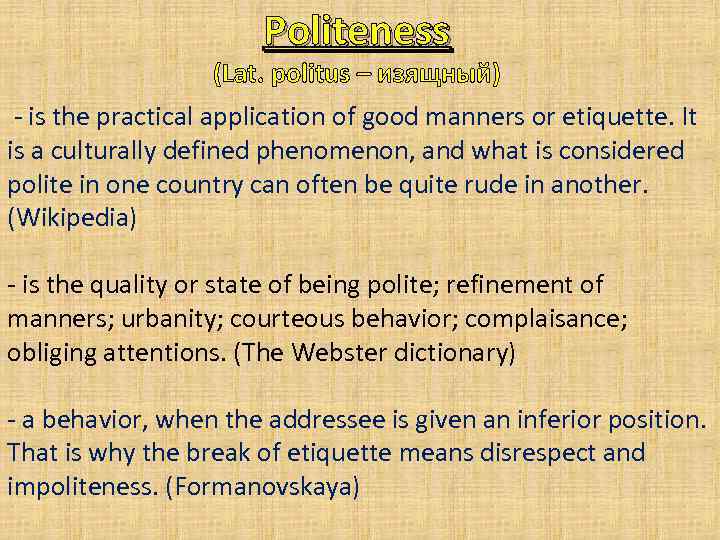 Politeness (Lat. politus – изящный) - is the practical application of good manners or etiquette. It is a culturally defined phenomenon, and what is considered polite in one country can often be quite rude in another. (Wikipedia) - is the quality or state of being polite; refinement of manners; urbanity; courteous behavior; complaisance; obliging attentions. (The Webster dictionary) - a behavior, when the addressee is given an inferior position. That is why the break of etiquette means disrespect and impoliteness. (Formanovskaya)
Politeness (Lat. politus – изящный) - is the practical application of good manners or etiquette. It is a culturally defined phenomenon, and what is considered polite in one country can often be quite rude in another. (Wikipedia) - is the quality or state of being polite; refinement of manners; urbanity; courteous behavior; complaisance; obliging attentions. (The Webster dictionary) - a behavior, when the addressee is given an inferior position. That is why the break of etiquette means disrespect and impoliteness. (Formanovskaya)
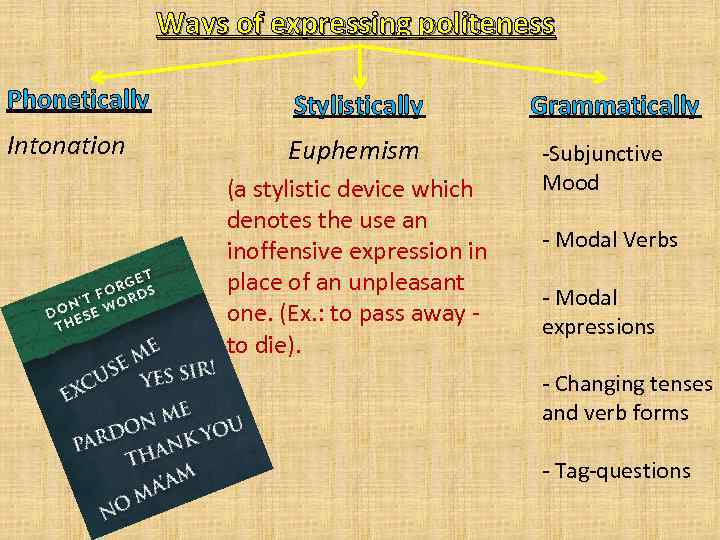 Ways of expressing politeness Phonetically Stylistically Intonation Euphemism (a stylistic device which denotes the use an inoffensive expression in place of an unpleasant one. (Ex. : to pass away to die). Grammatically -Subjunctive Mood - Modal Verbs - Modal expressions - Changing tenses and verb forms - Tag-questions
Ways of expressing politeness Phonetically Stylistically Intonation Euphemism (a stylistic device which denotes the use an inoffensive expression in place of an unpleasant one. (Ex. : to pass away to die). Grammatically -Subjunctive Mood - Modal Verbs - Modal expressions - Changing tenses and verb forms - Tag-questions
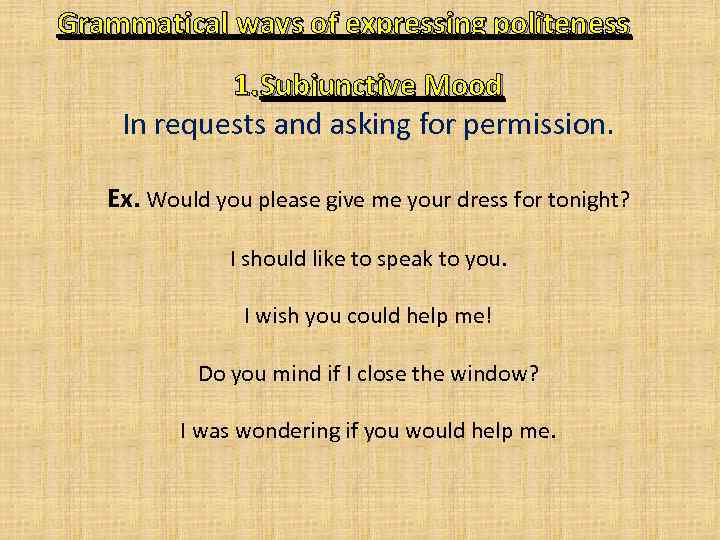 Grammatical ways of expressing politeness 1. Subjunctive Mood In requests and asking for permission. Ex. Would you please give me your dress for tonight? I should like to speak to you. I wish you could help me! Do you mind if I close the window? I was wondering if you would help me.
Grammatical ways of expressing politeness 1. Subjunctive Mood In requests and asking for permission. Ex. Would you please give me your dress for tonight? I should like to speak to you. I wish you could help me! Do you mind if I close the window? I was wondering if you would help me.
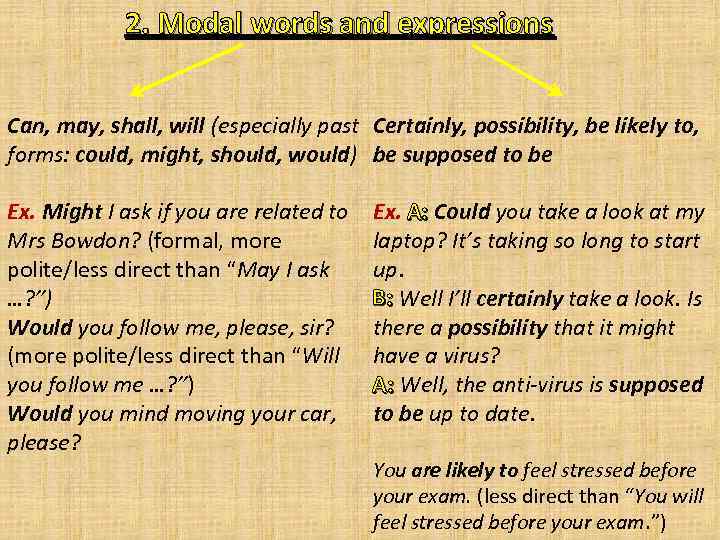 2. Modal words and expressions Can, may, shall, will (especially past Certainly, possibility, be likely to, forms: could, might, should, would) be supposed to be Ex. Might I ask if you are related to Mrs Bowdon? (formal, more polite/less direct than “May I ask …? ”) Would you follow me, please, sir? (more polite/less direct than “Will you follow me …? ”) Would you mind moving your car, please? Ex. A: Could you take a look at my laptop? It’s taking so long to start up. B: Well I’ll certainly take a look. Is there a possibility that it might have a virus? A: Well, the anti-virus is supposed to be up to date. You are likely to feel stressed before your exam. (less direct than “You will feel stressed before your exam. ”)
2. Modal words and expressions Can, may, shall, will (especially past Certainly, possibility, be likely to, forms: could, might, should, would) be supposed to be Ex. Might I ask if you are related to Mrs Bowdon? (formal, more polite/less direct than “May I ask …? ”) Would you follow me, please, sir? (more polite/less direct than “Will you follow me …? ”) Would you mind moving your car, please? Ex. A: Could you take a look at my laptop? It’s taking so long to start up. B: Well I’ll certainly take a look. Is there a possibility that it might have a virus? A: Well, the anti-virus is supposed to be up to date. You are likely to feel stressed before your exam. (less direct than “You will feel stressed before your exam. ”)
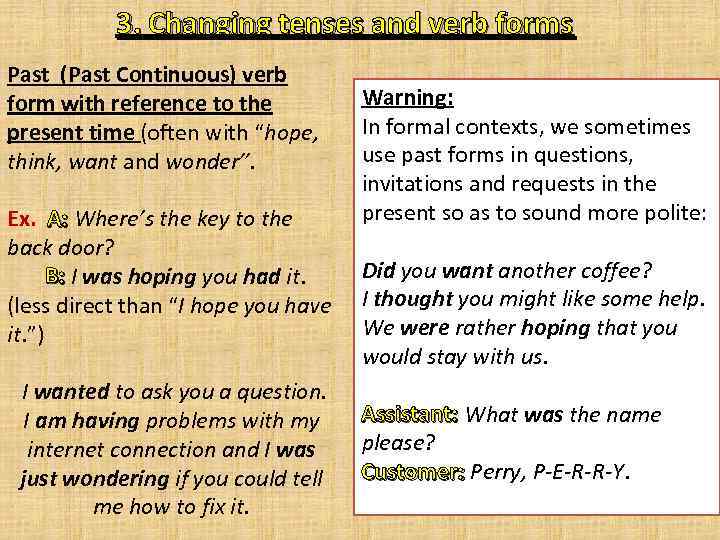 3. Changing tenses and verb forms Past (Past Continuous) verb form with reference to the present time (often with “hope, think, want and wonder”. Ex. A: Where’s the key to the back door? B: I was hoping you had it. (less direct than “I hope you have it. ”) I wanted to ask you a question. I am having problems with my internet connection and I was just wondering if you could tell me how to fix it. Warning: In formal contexts, we sometimes use past forms in questions, invitations and requests in the present so as to sound more polite: Did you want another coffee? I thought you might like some help. We were rather hoping that you would stay with us. Assistant: What was the name please? Customer: Perry, P-E-R-R-Y.
3. Changing tenses and verb forms Past (Past Continuous) verb form with reference to the present time (often with “hope, think, want and wonder”. Ex. A: Where’s the key to the back door? B: I was hoping you had it. (less direct than “I hope you have it. ”) I wanted to ask you a question. I am having problems with my internet connection and I was just wondering if you could tell me how to fix it. Warning: In formal contexts, we sometimes use past forms in questions, invitations and requests in the present so as to sound more polite: Did you want another coffee? I thought you might like some help. We were rather hoping that you would stay with us. Assistant: What was the name please? Customer: Perry, P-E-R-R-Y.
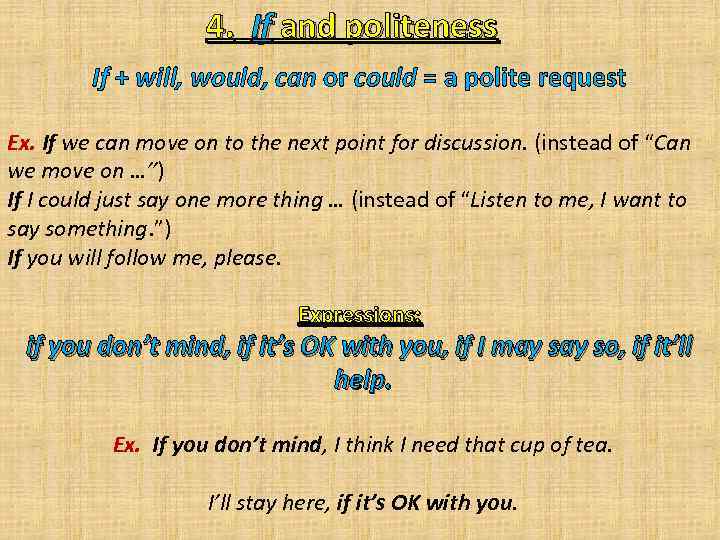 4. If and politeness If + will, would, can or could = a polite request Ex. If we can move on to the next point for discussion. (instead of “Can we move on …”) If I could just say one more thing … (instead of “Listen to me, I want to say something. ”) If you will follow me, please. Expressions: if you don’t mind, if it’s OK with you, if I may so, if it’ll help. Ex. If you don’t mind, I think I need that cup of tea. I’ll stay here, if it’s OK with you.
4. If and politeness If + will, would, can or could = a polite request Ex. If we can move on to the next point for discussion. (instead of “Can we move on …”) If I could just say one more thing … (instead of “Listen to me, I want to say something. ”) If you will follow me, please. Expressions: if you don’t mind, if it’s OK with you, if I may so, if it’ll help. Ex. If you don’t mind, I think I need that cup of tea. I’ll stay here, if it’s OK with you.
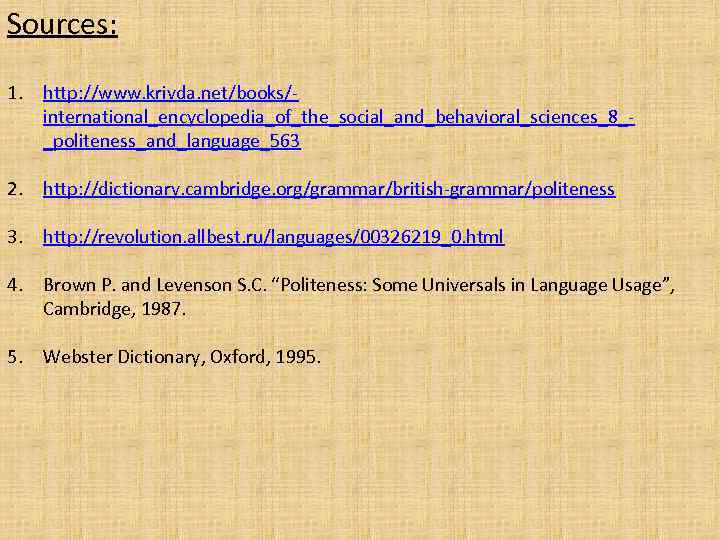 Sources: 1. http: //www. krivda. net/books/international_encyclopedia_of_the_social_and_behavioral_sciences_8__politeness_and_language_563 2. http: //dictionary. cambridge. org/grammar/british-grammar/politeness 3. http: //revolution. allbest. ru/languages/00326219_0. html 4. Brown P. and Levenson S. C. “Politeness: Some Universals in Language Usage”, Cambridge, 1987. 5. Webster Dictionary, Oxford, 1995.
Sources: 1. http: //www. krivda. net/books/international_encyclopedia_of_the_social_and_behavioral_sciences_8__politeness_and_language_563 2. http: //dictionary. cambridge. org/grammar/british-grammar/politeness 3. http: //revolution. allbest. ru/languages/00326219_0. html 4. Brown P. and Levenson S. C. “Politeness: Some Universals in Language Usage”, Cambridge, 1987. 5. Webster Dictionary, Oxford, 1995.
